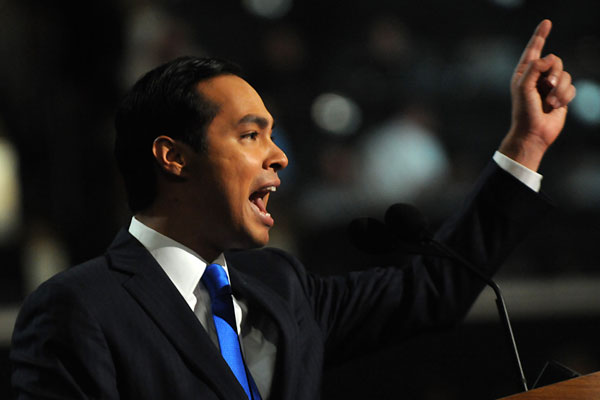A charismatic young Hispanic politician yesterday delivered one of the best speeches in recent memory on the American Dream. In retelling the story of his family’s rise from poverty, he hit all the right notes. He described America as “the land of opportunity,” praised hard work, stressed the importance of pulling ourselves up by the bootstraps, and celebrated individual success. He concluded by invoking the “wisdom of our founders and the values of families.”
So what was Marco Rubio doing delivering a nationally televised keynote address yesterday?
Well, that wasn’t Rubio but rather Julian Castro, the mayor of San Antonio and a rising star in the Democratic Party.
The moving personal story and all the talk of opportunity, prosperity and hard work were a brilliant display of one of the oldest rhetorical tricks of the left: the repackaging of statism and governmental paternalism under the guise of traditional American ideals. There was just enough of the real American Dream in Castro’s fine speech for you perhaps not to notice that he was in fact selling a very different dream: a liberal dream where big government is there every step of the way, slowly sapping our self-reliant spirit and transforming Americans into a herd of timid and envious creatures who turn for succor to an omnipotent state.
For the left, government spending to “stimulate the economy” and cradle-to-grave entitlements are what makes the American Dream possible. Hence Castro’s line that we must “invest in opportunity today for prosperity tomorrow.” The auto bailouts, the stimulus, Obamacare, the orgy of spending we’ve witnessed in recent years—they are all about “investing” in opportunity. Free markets don’t create opportunity—government spending does.
Absent from this dream is even the slightest acknowledgment of how all this spending and red tape actually restricts opportunity—by saddling the next generation with an unconscionable level of debt ($16 trillion as of yesterday), submerging job-creating businesses under a regulatory tidal wave, and fueling crony capitalism and rigging the rules in favor of the well-connected big players.
Castro’s perfunctory nods to work and family notwithstanding, this new dream also ignores the profound damage done by the welfare state to the real pillars of the American Dream. Far from fulfilling its promises of eradicating poverty and creating opportunity, the welfare state in fact traps people in poverty by undermining the family and discouraging work.
To convince Americans to sign off on his call to “invest in opportunity,” Castro made sure to depict the alternative in true straw-man terms as a Wild West bordering on anarchy where it’s every man, woman, and child for himself:
Of all the fictions we heard last week in Tampa, the one I find most troubling is this: If we all just go our own way, our nation will be stronger for it. Because if we sever the threads that connect us, the only people who will go far are those who are already ahead.
This in fact the great fiction of the left: the Manichean choice between a world where we are all completely on our own and the togetherness of government. Faced with such stark alternatives, who but the most hardened of Ron Swansons will dare oppose the benevolent nanny state?
In reality, of course, the conservative opposition to big government goes hand in hand with a strong defense of civil society. In between the individual and the state exists the vibrant realm of civil society where Americans join and form myriad associations, from families to churches to Rotary clubs. In trying to rein in limitless liberalism, conservatives want to strengthen the real robust ties that bind us to one another and sever the flimsy ties of dependence on government.
When we depend on the government, we don’t depend on each other. And any dream that tries to substitute individual effort and civic interdependence with collective government dependency is no American Dream. What’s worse, by eroding the great American spirit of self-reliance, it threatens to make the American Dream a distant memory.
